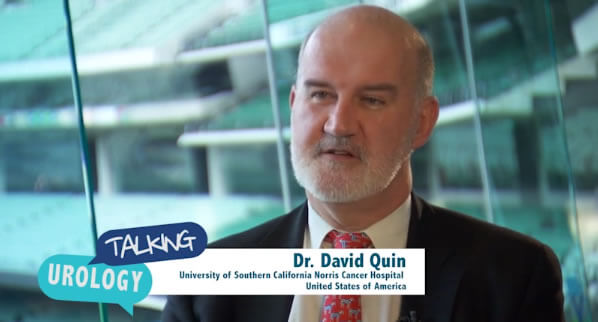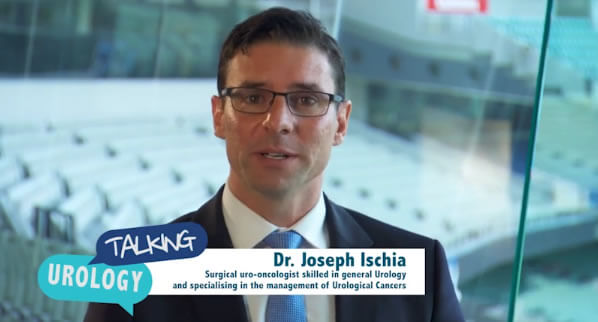USANZ 2017 – Dr Mark Frydenberg
Mark Frydenberg AM @mfrydenberg is Past President of USANZ, a Uro-oncologist with Australian Urology Associates and Professor, Department of Surgery, Monash University. Professor Frydenberg gives his presidential insights.
Talking Urology podcast transcript
USANZ 2017 Interviews – Mark Frydenberg
This is Talking Urology.
Joseph Ischia: It was a pleasure to catch up with Mark Frydenberg. He’s a Professor of Urology at Monash University and has been our inspirational leader and president for the last two years of USANZ. He’s here to give us some presidential insights.
Dr. Mark Frydenberg: Thanks, Joseph. The two-year term has actually really been very, it’s very enjoyable, but also very challenging at the same time. I think from just an organizational and personal viewpoint, I mean, it’s been a terrific personal growth thing for me. You know, it certainly does allow you to meet a lot of both national and international people, incredibly talented and smart and intelligent and you know they do become your friends but you learn a lot from them as well and also the process of actually just running the organization, actually you learn a whole lot of skills that you don’t have previously. As an organization, we’ve really developed a lot too. I think this meeting clearly highlights that. But our stature, I think, in the international urologic community has actually increased enormously and I think a lot of that has been due to a lot of the work that the society has done in building bridges with a lot of the international organizations. I think at home the challenges the urologists are to really adept to the current working environment in 2017. I highlighted that a little bit in the opening address in the opening session of the meeting. I think in the past, if you go back you know 5-10 years ago, we largely self-regulated. You know, would be sort of doing any procedure that we thought that we were able to do. We would perhaps as a group examine you know our own outcomes, you know, complications, morbidity, mortalities. Cost really were looked at and so on, but all of it was pretty much done as sort of an internal process by ourselves as a group of responsible professional specialists. But the world has changed and that has probably changed because of the fact that medicine is expensive. Health funds and private health insurance at least in Australia is I think viewed as a fairly poor product by a lot of people currently because of a lot of the excessive costs that they have to pay on top of their fees and most other insurances, the insurance covers for whatever it is they go through, that’s not the case in health insurance. So, there’s a lot of issues that are there and governments are well aware of all of these issues and governments are also well aware that there are different competencies among surgical specialists which need to be addressed and there are different outcomes between surgeons as well. So, the world has moved on, so as examples of that, you’ve got the government who funds the quality and safety commission. They have an Atlas of Healthcare. So, that’s not looking at costs or outcomes but it is looking at patterns of care across the country. So when they look at a major metropolitan city in Australia and they see that one district has three times a prostate biopsy rate of another district, they ask questions, you know, why is that the case. Now, there may well be a good explanation but there may not be either. So the problem is that they’re watching and it’s important for everyone to understand that they’re watching. Similarly with regards to what urologists can and can’t do. Again, I think they’re aware that most surgical specialties have now subspecialized so that there are some people that are better at things than others and there is still some general specialists but there’s a lot of subspecialists that really just do work in one area. So governments now are beginning to sort of get involved in that space and saying well we need to have a very transparent way of knowing which people can do what safely, and that’s why, for example, in New South Wales there’s a scope of practice commission that are doing a project to try and work out what is core urology procedures that any urologist can do but what are some procedures that can’t be done. So again this is another example of something where previously we were self-regulating but in fact we’ve got external bodies now looking at us. Fees are another issue. So you’ve got private health funds like Medibank Private, Bupa that are now publishing patient outcomes not only with regard to outcomes of surgery and complications but also out-of-pocket costs. So they’re very transparently being looked at by all of the health funds and then at the end of the day you’ve also got surgical complications and outcomes which again are being looked at by various organizations. There’s a group called the Health Roundtable that are looking at this data. You’ve got the health funds that are looking at this data as well. So the reality is that there actually are now a number of agencies that are invading our space. The initial reaction of even myself as a practicing urologist but really all urologist is that of discomfort because of the fact we’re not used to having people looking over our shoulder at what we’re doing. We’re used to regulating things ourselves and it’s a bit of an affront on our own professionalism because we’ve always viewed that we handle ourselves ethically and appropriately and do make good decisions for patients and do good surgery and we do. The problem is that we have to unfortunately have to get over the discomfort. We have to adapt to this. This is not going away. All this stuff is going to remain because for the community it’s expensive and it’s important. From my perspective, I think it’s really just a matter of us now adapting it. We need to be very proactive in this area and actually have a seat at the table, otherwise, data is actually going to be misinterpreted. But the reality is that if like most urologists, we are practicing good quality urology, we’re making good decisions for our patients, we’re charging them fairly, and we’re getting good outcomes for them with minimal complications, there’s actually nothing to fear about this process because they will actually see how good we are as a profession. You and I know that we are, but we shouldn’t fear other people having a look to actually see exactly how good we are, so we have to get over that discomfort and just adapt.
Joseph: So we need to step up with more transparent self-regulation to avoid having regulation thrust upon us.
Mark: In a lot of ways. I think we have to just, I think it’s a two-pronged thing. I think we’ve got to be very active in collecting our own data so that we’ve got our own data there to look at. For example, in the oncology area, be involved in the Prostate Cancer Outcomes Registry. There’s a lot of evidence that has led to substantially improved outcomes in the areas where it’s been adopted for several years and it’s not being punitive. No one’s been harmed by it but it’s actually at a community level led to a much better standard of care in prostate cancer. This society is going to be setting up a Urologic Surgery Registry. It’ll start off with looking at nephrectomies and again we just want to collect the data transparently ourselves because that’ll actually show to the outside world we’re actually committed to quality and safety. So we’re leading by example but then we’ve also got to realize that these other processes are still going on. We need to have a seat at the table and just be engaged with them because otherwise they could easily misinterpret the data and then suddenly have things thrust upon us that are actually not factually correct and actually could potentially harm us. So, you know, we’ve got to not be scared by it, we’ve got to be engaged, and we’ve got to make sure and we need to be engaged you know partly for the interpretation but also partly to actually make sure that you know we all know in the future that urologists are protected in being able to do what they do.
Joseph: So you’re two years of president are up and you’ve handed over the rather large medal to Peter Heathcote. Do you have any advice for him over the next two years?
Mark: I think really it’s just a matter of just always doing what’s correct for the organization and to maintain the standards of the Urological Society of Australia and New Zealand. I think as long as you are always putting the ethical proper position of the society first then you’re actually doing the right thing both by the community and by the urologist, and I think as long as you know he remains engaged and continues to do that then there weren’t be any issues at all and I’ll look forward to helping him as past president and also in my role as the urology counsellor at the Royal Australasian College of Surgeons while I will obviously also continue to do my best to look after my colleagues.
Joseph: I think USANZ is in safe hands. Thanks very much.
Mark: Good on you, Joseph.










